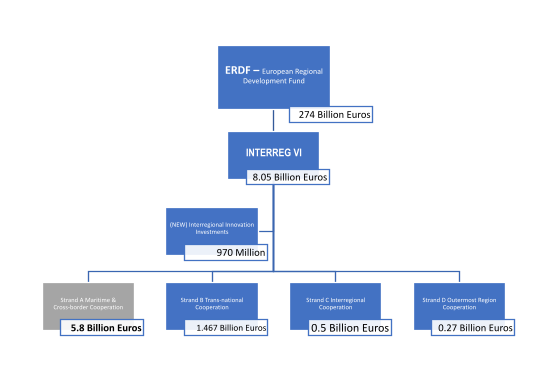
INTERREG VI – Strand B (Trans-National Cooperation)
General information
Previous name: INTERREG V - A
Organigram

Introduction
Building on a successful pilot action from 2014-2020, the Commission proposes to create the Interregional Innovative Investments. Regions with matching ‘smart specialisation’ assets will be given more support to build pan-European clusters in priority sectors such as big data, circular economy, advanced manufacturing or cybersecurity.
The regions to be supported by the ERDF shall be the NUTS level 2 regions of the Union covering contiguous functional areas, taking into account, where applicable, macro-regional strategies
Specific objectives under PO4:
- enhancing the effectiveness of labour markets and improving access to Quality employment across borders;
- improving access to and the quality of education, training and lifelong Learning across borders with a view to increasing the educational attainment and skills
- levels thereof as to be recognised across borders;
- enhancing the equal and timely access to quality, sustainable and affordable healthcare services across borders;
- improving accessibility, effectiveness and resilience of healthcare systems and long-term care services across borders;
- promoting social inclusion and tackling poverty, including by enhancing equal opportunities and combating discrimination across borders.
Proposals should focus also on:
- enhance institutional capacity of public authorities and stakeholders to implement macro-regional strategies
Focus of funding for 2021-2027
Building on a successful pilot action from 2014-2020, the Commission proposes to create the Interregional Innovative Investments. Regions with matching ‘smart specialisation’ assets will be given more support to build pan-European clusters in priority sectors such as big data, circular economy, advanced manufacturing or cybersecurity.
For cross-border cooperation, the regions to be supported by the ERDF shall be the NUTS level 3 regions of the Union along all internal and external land borders with third countries or partner countries. Regions on maritime borders which are connected over the sea by a fixed link shall also be supported under cross-border cooperation.
Specific objectives under PO4:
- enhancing the effectiveness of labour markets and improving access to Quality employment across borders;
- improving access to and the quality of education, training and lifelong Learning across borders with a view to increasing the educational attainment and skills
- levels thereof as to be recognised across borders;
- enhancing the equal and timely access to quality, sustainable and affordable healthcare services across borders;
- improving accessibility, effectiveness and resilience of healthcare systems and long-term care services across borders;
- promoting social inclusion and tackling poverty, including by enhancing equal opportunities and combating discrimination across borders.
Proposals should focus also on:
- Enhance the institutional capacity of public authorities, in particular those mandated to manage a specific territory, and of stakeholders;
- Enhance efficient public administration by promoting legal and
- administrative cooperation and cooperation between citizens and institutions, in particular, with a view to resolving legal and other obstacles in border regions;
Thematic Priorities
- Research & Innovation
- Development & Cooperation
- Environment
- Climate Action
- Business and Industry
- Migration
- Europe for Citizens
Participating countries
- EU27 (NO DK)
- IPA
- ACP
- NDICI
Possible applicants
- NGOs
- Research Institutes
- Public Bodies
Target group / Final beneficiaries
- SMEs
- Civil Society
Budget
Total Budget for 2014-2020
10.1 Billion Euros (Total Interreg V Budget)
7.5 Billion Euros: Interreg V-A (2014-2020)
2.1 Billion Euros: Interreg V-B (2014-2020)
0.5 Billion Euros: Interreg V-C (2014-2020)
Total Budget for 2021-2027
1.467 Billion Euros
Increase / Decrease in %
Decreased by 31%
Budget per project
Average
150.000 Euros (Interreg C data)
Min.
/
(depending on the call)
Max.
/
(depending on the call)
Complexity of budget from 1 (easy) to 5 (difficult): 3
Criteria for the complexity of budget (How detailed is the budget, how complex is the documentation, availibility of documentation, etc.)
- The support documentation is not very complex;
- There is a lot of information to research and assimilate regarding the implementations and the financial management of the Project.
Tips for applicants on budgeting
- SCO – Simplified Cost Options;
- Framework will be shared between all 7 CPR funds through a single rulebook;
- Pre-financing to be paid for Interreg Programmes of 1% in 2021 and 2022, amount raised to 3% from 2023 onwards;
- Check thoroughly the specific regulation;
- A specific EU co-financing rate of 80%, increased to 85% for outermost regions, agreed upon in the Common Provisions Regulation
Programme-Specific Tips for Applicants
2-3 lessons learnt in 2014-2020
- 80 simplification measures to be applied in cohesion policy 2021-27 (simplification handbook available online);
- All programme evaluation reports have confirmed the efficient and effective programme support to projects and the related satisfaction of beneficiaries;
- Emphasis on the intention to communicate broadly the positive results of cohesion Policy;
- Member States and regions have reinforced requirements in terms of communication, such as the organisation of events for the opening of big EU-funded projects and the development of social media outreach plans;
Programme Specific Practical Information
- Select a strong consortia of partners;
- Carefully read the text of the Call;
- Present an Innovative approach on the project description, goals and methodology;
- Emphasis on the intention to communicate broadly the positive results of cohesion Policy. Member States and regions have reinforced requirements in terms of communication, such as the organisation of events for the opening of big EU-funded projects and the development of social media outreach plans
Positive aspects
- Opportunities for Networking;
- Wide variety of elegible costs (staff, office and administrative, travel, expertise, equipement, infrastructures, etc.);
- Increased Flexibility provisions facilitating support for small projects and people-to-people projects: up to 20% within an Interreg programme may be allocated to small project funds;
- A complete and flexible set of support to technical assistance, tailored to the needs of each type of programme
Negative Aspects
- Co-financing rates decreased from 85% to 80% on 2021-2027 period;
- Bureaucratic burden
Related Links
- Interreg website https://interreg.eu/
- EU Policy for European territorial cross-border cooperation https://ec.europa.eu/regional_policy/en/policy/cooperation/european-territorial/cross-border/#4
- EU legislation in progress for European territorial cooperation
- (Interreg) 2021-2027 http://www.europarl.europa.eu/RegData/etudes/BRIE/2018/628228/EPRS_BRI(2018)628228_EN.pdf
- New Cohesion Policy https://ec.europa.eu/regional_policy/en/2021_2027/
- Proposal (Document 1 &2) for a REGULATION OF THE EUROPEAN PARLIAMENT AND OF THE COUNCIL on specific provisions for the European territorial cooperation goal (Interreg) supported by the European Regional Development Fund and external financing instruments https://eur-lex.europa.eu/legal-content/EN/TXT/?uri=COM%3A2018%3A374%3AFIN
- Special meeting of the European Council (17, 18, 19, 20 and 21 July 2020) https://www.consilium.europa.eu/media/45109/210720-euco-final-conclusions-en.pdf
- Commission welcomes the political agreement on the Interreg Regulation https://ec.europa.eu/regional_policy/en/newsroom/news/2020/12/12-02-2020-commission-welcomes-the-political-agreement-on-the-interreg-regulation?utm_campaign=58c985f573a6a3222e00ec4c&utm_content=5fc7c49af8c8cd0001524a9c&utm_medium=smarpshare&utm_source=linkedin
DOs and DON'Ts
DOs
01.
Close a strong consortium as soon as possible
02.
Hire a specialist consultant if you don’t have previous experience;
03.
Read the call thoroughly;
DON'Ts
01.
Overestimate the budget
